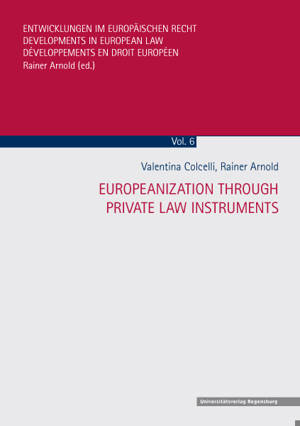
- Afhalen na 1 uur in een winkel met voorraad
- Gratis thuislevering in België vanaf € 30
- Ruim aanbod met 7 miljoen producten
- Afhalen na 1 uur in een winkel met voorraad
- Gratis thuislevering in België vanaf € 30
- Ruim aanbod met 7 miljoen producten
Zoeken
Europeanization Through Private Law Instruments
Valentina Colcelli, Rainer Arnold
Paperback | Engels | Entwicklung im Europäischen Recht | Developments in European Law | Développments in Droit Européen | nr. 6
€ 80,95
+ 161 punten
Omschrijving
The aim of the book is to investigate, on the more strictly legal side, the nature of the regulatory approach characterizing the EU system. The EU legal system - thanks to the multilevel dimension of European private law - has been marked by the use of new ways for governing its market integration, as complementary or alternative answers to legislative harmonisation realised implemented with institutional instruments. Family private law instruments such as tort or contract now appear only as a small part of many possible tools harnessed to the pursuit of allocative efficiency or distributive justice. Conversely, the range of arrangements of available public regulatory tools is extremely varied. The private law offers complementary remedies in individual situations through contract law, above all consumer law in the case of information problems, and at the same time as tort law assumes the effects of externalities suffered by third parties. Tort law may also give ex-post specific remedies, in case one party has been severely underprivileged. 'Social' regulation of Private, is correlated to distributive justice and to the insufficient resources of the part of the people excluded from acceding to essential services, to the greater bargaining power of the service provider, or to the inadequate financial and educational endowment of consumers to best measures their preferences.
Specificaties
Betrokkenen
- Auteur(s):
- Uitgeverij:
Inhoud
- Aantal bladzijden:
- 270
- Taal:
- Engels
- Reeks:
- Reeksnummer:
- nr. 6
Eigenschappen
- Productcode (EAN):
- 9783868451269
- Verschijningsdatum:
- 5/02/2016
- Uitvoering:
- Paperback
- Formaat:
- Trade paperback (VS)
- Afmetingen:
- 170 mm x 239 mm
- Gewicht:
- 149 g

Alleen bij Standaard Boekhandel
+ 161 punten op je klantenkaart van Standaard Boekhandel
Beoordelingen
We publiceren alleen reviews die voldoen aan de voorwaarden voor reviews. Bekijk onze voorwaarden voor reviews.







